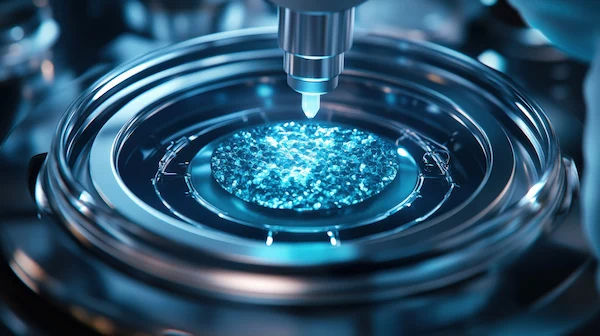Guide to Who Should Get Ivf Done
Guide to Who Should Get IVF Done Discover if IVF is the right fertility treatment for you. Learn about the medical criteria, common indications (like blocked tubes, male factor infertility, and unexplained infertility), age considerations, and what to discuss with your doctor.

Written by Dr. Shaik Abdul Kalam
Reviewed by Dr. Dhankecha Mayank Dineshbhai MBBS
Last updated on 13th Jan, 2026

Introduction
The journey to parenthood isn't always straightforward. If you've been trying to conceive without success, you may have heard the term "IVF" and wondered if it's an option for you. Vitr Fertilisation (IVF) is one of the most effective forms of assisted reproductive technology (ART), but understanding who should get IVF done is the first critical step. This guide is designed to demystify the process, not just by listing medical conditions, but by helping you understand the physical, emotional, and financial considerations involved. We'll explore the common reasons people turn to IVF, from tubal blockages and male factor infertility to family building for the LGBTQ+ community and genetic screening. Our goal is to empower you with the knowledge to have an informed conversation with a specialist. If you're asking yourself, "Is IVF right for me?" you've come to the right place.
Understanding IVF: More Than Just "Test Tube Babies"
IVF, or In Vitro Fertilisation, is a process where eggs are retrieved from the ovaries and fertilised by sperm in a laboratory dish. The resulting embryo(s) are then transferred to the uterus. While it's often simplistically called a "test tube baby" procedure, modern IVF is a sophisticated series of carefully timed medical steps. It's primarily used when other, less invasive fertility treatments like medication or Intrauterine Insemination (IUI) have not been successful or are not suitable.
The decision to pursue IVF treatment is significant. It's not a first-line treatment for every case of infertility but is instead a powerful tool for specific challenges. For instance, if the fallopian tubes are blocked, IVF bypasses them entirely. If sperm count or motility is low, IVF can help by directly injecting a single sperm into an egg (a process called ICSI). Understanding this fundamental principle—that IVF can circumvent specific anatomical or biological hurdles—is key to knowing who should get IVF done.
The Primary Medical Reasons for Considering IVF
Most individuals and couples explore IVF after a year (or six months if over 35) of unsuccessful trying. A fertility evaluation can then pinpoint specific issues that make IVF the recommended path.
For Women and People Assigned Female at Birth (AFAB)
Several female-factor conditions can lead to a recommendation for IVF.
• Fallopian Tube Damage or Blockage: The fallopian tubes are where natural fertilisation occurs. If they are blocked or damaged by conditions like pelvic inflammatory disease (PID) or previous surgery, the egg and sperm cannot meet. IVF is often the only way to achieve pregnancy in these cases, as it completely bypasses the tubes.
• Ovulation Disorders: Conditions like Polycystic Ovary Syndrome (PCOS) can prevent the regular release of eggs. While often treated first with medication, if these treatments fail, IVF for PCOS can be a highly successful option by stimulating the ovaries to produce multiple eggs for retrieval.
• Endometriosis: This condition, where tissue similar to the uterine lining grows outside the uterus, can affect egg quality, implantation, and cause scarring. IVF can help overcome these challenges by retrieving eggs before they are affected and creating a controlled environment for embryo transfer.
• Diminished Ovarian Reserve (Low Egg Count): As a woman ages, the quantity and quality of her eggs decline. For those with a low ovarian reserve, either due to age or other medical reasons, IVF allows for the collection and fertilisation of multiple eggs in a single cycle, maximising the chances of creating a viable embryo.
For Men and People Assigned Male at Birth (AMAB)
Male Factor Infertility: This accounts for a significant portion of infertility cases. Issues can include low sperm count (oligospermia), poor sperm motility (asthenospermia), or abnormal sperm shape (teratospermia). IVF with male factor infertility, especially when combined with Intracytoplasmic Sperm Injection (ICSI), can achieve fertilisation even with very few healthy sperm.
Unexplained Infertility: When There's No Clear Answer
In about 10-30% of cases, standard fertility testing reveals no obvious cause for infertility. This can be incredibly frustrating. After several failed cycles of less invasive treatments, IVF may be recommended. It can sometimes uncover issues not detected in standard tests, such as problems with egg fertilisation, and offers a higher success rate per cycle.
Beyond Infertility: Other Paths to IVF
IVF is not solely for couples facing medical infertility. Its applications have expanded to serve a wider range of family-building goals.
• Genetic Disorder Screening (PGT): Couples who are carriers of genetic disorders (like cystic fibrosis or sickle cell anemia) can use IVF with Preimplantation Genetic Testing (PGT). This allows embryos to be screened for the specific disorder before transfer, significantly reducing the risk of passing it on to the child.
• Fertility Preservation: For Medical and Personal Reasons: Individuals facing medical treatments like chemotherapy or radiation that can harm fertility can freeze their eggs, sperm, or embryos for future use. Furthermore, IVF for fertility preservation is increasingly chosen for social reasons, allowing people to delay childbearing while preserving their biological options.
• Building LGBTQ+ Families and Using a Surrogate: IVF is essential for same-sex female couples and single women using donor sperm to conceive. Similarly, for couples or individuals who require a gestational surrogate (due to medical conditions that make pregnancy impossible or dangerous), IVF is used to create embryos that are then transferred to the surrogate.
Consult Top Specialists
Are You Emotionally and Financially Ready for IVF?
The IVF journey is as much an emotional and financial commitment as it is a physical one. The process can be stressful, involving daily injections, frequent monitoring appointments, and the anxiety of waiting for results. The financial cost can also be substantial, and it's crucial to understand what your insurance covers, if anything. Success is not guaranteed; it's often a numbers game that may require multiple cycles. Before beginning, it's wise to have a strong support system and to consult a fertility counsellor. They can provide strategies for coping with the emotional rollercoaster. If you're feeling overwhelmed, you can also consult a doctor online with Apollo24|7 to discuss your concerns and get initial guidance in a private setting.
The 5 Key Questions to Ask Yourself Before Starting IVF
1. Have we completed a thorough fertility evaluation? IVF should be a targeted solution, not a shot in the dark. Ensure both partners have undergone comprehensive testing.
2. Have we explored and exhausted less invasive options? Depending on the diagnosis, treatments like medication or IUI might be appropriate first steps.
3. Are we aligned on our boundaries? Discuss how many cycles you are willing to attempt, what you will do with any remaining frozen embryos, and your financial limit.
4. Do we have a strong support network? Who can you talk to about the stress and disappointment? Is professional counselling an option?
5. How will we cope if it doesn't work? While it's important to be hopeful, having a plan for dealing with potential failure is a crucial part of emotional preparedness.
The IVF Journey: A Simplified Step-by-Step Overview
Understanding the process can alleviate fear of the unknown. A typical IVF cycle involves:
1. Ovarian Stimulation: Hormone injections are used to stimulate the ovaries to produce multiple eggs.
2. Egg Retrieval: A minor surgical procedure performed under sedation to collect the eggs.
3. Fertilisation: The eggs are fertilised with sperm in the lab.
4. Embryo Culture: The fertilised eggs are monitored for 3-6 days as they develop into embryos.
5. Embryo Transfer: One or more healthy embryos are transferred into the uterus using a thin catheter.
6. The Two-Week Wait: The period before a pregnancy test can confirm if the cycle was successful.
Conclusion
Deciding who should get IVF done is a deeply personal choice that blends medical necessity with individual circumstances. It is a beacon of hope for those facing blocked tubes, low sperm count, or the heartache of unexplained infertility, and a door to parenthood for single individuals and LGBTQ+ couples. However, it's a path that demands resilience, support, and realistic expectations. The most important step you can take is to become an informed advocate for your own health. Arm yourself with knowledge, ask detailed questions, and choose a fertility clinic and doctor you trust. Remember, you are not alone on this journey. If you suspect you might be a candidate for IVF, the next step is to book a physical visit to a doctor with Apollo24|7 for a comprehensive evaluation. Taking that first, proactive step can bring clarity and set you on the path toward achieving your dream of building a family.
Consult Top Specialists
Consult Top Specialists

Dr P Jagadeesha Chandra
General Physician/ Internal Medicine Specialist
37 Years • MBBS, MD
Bengaluru
Apollo Hospitals Jayanagar, Bengaluru

Dr. Aakash Garg
Gastroenterology/gi Medicine Specialist
12 Years • MBBS, DNB (Medicine), DrNB (Gastroentrology).
Bilaspur
Apollo Hospitals Seepat Road, Bilaspur
(150+ Patients)

Dr. Mohamed Azeem
General Physician/ Internal Medicine Specialist
2 Years • MBBS,MD(Internal Medicine) CCEBDM
Karaikudi
Apollo Hospitals Karaikudi, Karaikudi

Dr. R Gopakumar
Internal Medicine/ Covid Consultation Specialist
31 Years • MBBS, MD(general medicine
Angamaly
Apollo Hospitals Karukutty, Angamaly
(25+ Patients)

Dr. Nirmal Mathew Alex
General Physician/ Internal Medicine Specialist
17 Years • MBBS, MD(general medicine)
Angamaly
Apollo Hospitals Karukutty, Angamaly
(50+ Patients)
Consult Top Specialists

Dr P Jagadeesha Chandra
General Physician/ Internal Medicine Specialist
37 Years • MBBS, MD
Bengaluru
Apollo Hospitals Jayanagar, Bengaluru

Dr. Aakash Garg
Gastroenterology/gi Medicine Specialist
12 Years • MBBS, DNB (Medicine), DrNB (Gastroentrology).
Bilaspur
Apollo Hospitals Seepat Road, Bilaspur
(150+ Patients)

Dr. Mohamed Azeem
General Physician/ Internal Medicine Specialist
2 Years • MBBS,MD(Internal Medicine) CCEBDM
Karaikudi
Apollo Hospitals Karaikudi, Karaikudi

Dr. R Gopakumar
Internal Medicine/ Covid Consultation Specialist
31 Years • MBBS, MD(general medicine
Angamaly
Apollo Hospitals Karukutty, Angamaly
(25+ Patients)

Dr. Nirmal Mathew Alex
General Physician/ Internal Medicine Specialist
17 Years • MBBS, MD(general medicine)
Angamaly
Apollo Hospitals Karukutty, Angamaly
(50+ Patients)
More articles from pregnancy
Frequently Asked Questions
1. What is the main difference between IUI and IVF?
IUI (Intrauterine Insemination) involves placing washed sperm directly into the uterus around the time of ovulation, assisting sperm in reaching the egg. It is less invasive. IVF involves fertilising the egg with sperm outside the body in a lab and then transferring the resulting embryo into the uterus. IVF is more complex and has higher success rates per cycle, especially for severe infertility factors.
2. At what age is IVF most successful?
A woman's age is the single most important factor affecting IVF success rates. Success is highest for women under 35 and gradually declines with age, particularly after 40, due to a decrease in egg quantity and quality.
3. How many IVF cycles does it typically take to get pregnant?
There's no fixed number. While some are successful on the first try, many require multiple cycles. Statistics often show cumulative success rates increase with two or three cycles. Your doctor can give you a personalized prognosis based on your age and diagnosis.
4. Can I use IVF if I want to have a baby without a partner?
Absolutely. IVF is a common path to parenthood for single women and men. Women can use donor sperm, and men will need an egg donor and a gestational surrogate to carry the pregnancy.
5. Does IVF guarantee a healthy baby?
No medical procedure can guarantee a healthy baby. However, Preimplantation Genetic Testing (PGT), an add-on to IVF, can screen embryos for certain chromosomal abnormalities and genetic disorders, reducing the risk and increasing the chances of a healthy pregnancy.




